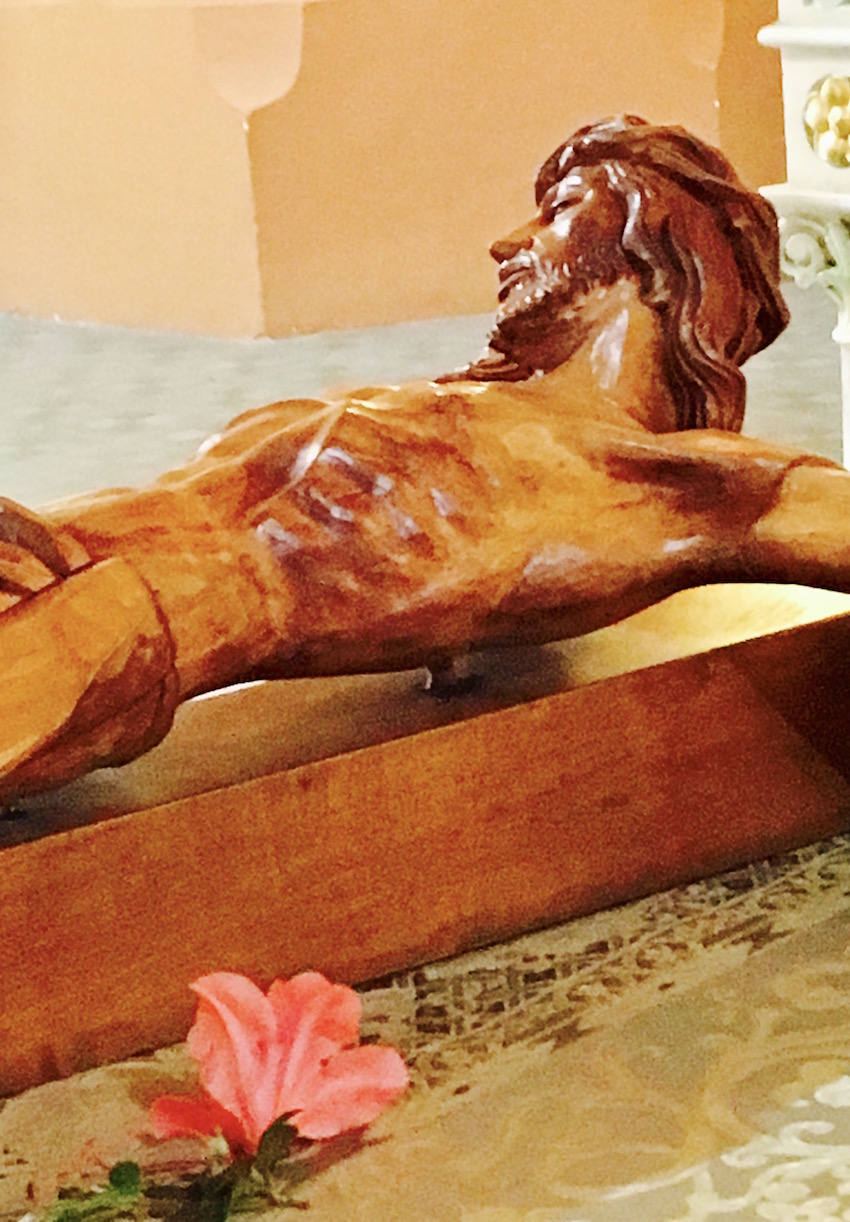As #MeToo campaigns rage and countless men are outed for the sexual harassment, abuse and assault of women, it may be time to look to a woman—THE WOMAN—for the answer on how to heal this mess...
Read moreIs Purgatory A Far Away Place? Or Does It Begin Here And Now?
While November brings to the fore the awareness of the holy souls in purgatory, the month of All Souls also begets an important question: Is purgatory a far away “place” or is it a state of existence all of us are called to, starting now?...
Read moreDid Padre Pio's Intercession Save My Dying Husband's Soul?
Every year when we celebrate the feast of St. Pius of Pietrelcina on September 23, still fondly known as “Padre Pio,” I gratefully remember the day I was “introduced” to him in the mid-1990s. It happened when my dry cleaner, Curt, dropped off a relic of the deceased Capuchin friar along with our newly cleaned clothes. “He’s a very powerful intercessor,” Curt said as he handed me a brochure with information about the legendary mystic, which also contained prayers for his miraculous intercession...
Read moreHow Unbridled Thinking Keeps Us Beside Ourselves And Unaware Of God's Presence Within
How much time do you spend in your mind, lost in world of racing thoughts concerning anything and everything but the present moment? Do you find yourself habitually living in a state of anxious deliberation fueled by past ponderings or future fears— instead of being fully present to God, yourself and others?...
Read moreWhen God Lets Us Wait: The Hidden Grace of Unanswered Prayers
Here we go again, you may be moaning as a painful situation rears its ugly head one. more. time. Perhaps you’ve prayed for a miracle for years, decades, even a lifetime. Maybe you’re exhausted from asking God to answer a prayer, or just flat angry at him for apparently not hearing you—especially if you’ve begged incessantly for something good, like a healing, conversion, or cure—something God would surely want, right?...
Read moreA Potent Prayer for the Healing of the World
With the world teetering on the edge of nuclear war and anxieties running high, I humbly share with you a powerful prayer for healing and conversion given to me some months ago in prayer before the Blessed Sacrament. This prayer grew out of the recognition that we can “stand in the gap” in intercessory prayer like Abraham (Gen. 18:23), Moses (Exodus 32:11-14), and Ezekiel (Ez. 22:30), pleading for God’s mercy upon us and upon our broken world...
Read moreHow Consecrating My Life to Mary Radically Changed My Life
 Dear Friends,
Dear Friends,
Today is the feast of St. Louis de Montfort, who died on this day nearly 200 years ago. St. Louis was French priest who tirelessly promoted both devotion to and consecration to the Immaculate Heart of Mary. In honor of this feast day, and in preparation for the 100th anniversary of the Blessed Mother’s apparition at Fatima on May 13, I would like to share with you an excerpt from my book, Mary’s Way, about the impact consecrating myself to Mary made on my life. I would also like to ask you to prayerfully consider consecrating your life to Mary—it is nothing short of life changing! Two wonderful resources for the consecration are “Preparation for Total Consecration According to St. Louis Marie de Montfort” and a newer version of the consecration, “33 Days to Morning Glory,” which I am reading now to renew my own consecration on May 13. It is excellent and very enlightening!
Also, I am excited to let you know that Mary’s Way: The Power of Entrusting Your Child to God will be offered by Ave Maria Press at a 25% discount for Mother’s Day. You can order the book at this link using the code MOM2017.

Blessings and grace to you and yours this Easter season.
Judy
From Mary’s Way: The Power of Entrusting Your Child to God, p. 92-95
Mary, the Woman for All Women
The second nut to crack—the heart problem I had concerning Mary—was harder, as it involved serious questions about my identity as a woman and about my own ongoing conversion. Would I be willing to be changed that I might embrace Mary as the model of my own femininity? Was I prepared to lay down the notions of womanhood in which I had been formed, making space for something new, such as accepting the idea that Mary’s way—and not the way of radical feminism—is the life-giving way for women? And would I let Mary lead me by the hand as I sought to love Jesus and as I tried to help my children find Christ in a post-Christian culture that has lost him almost completely? It was in the midst of pondering these questions not long after my return to the Catholic Church that some- one mentioned to me St. Louis Marie de Montfort’s “Total Consecration to Jesus through Mary.”
Anyone who has made the thirty-three-day consecration to Mary’s Immaculate Heart can tell you how powerful and life changing it is, just as the women in our parish Rosary group told me one providential day. Peggy, who had recently made the consecration herself, was sharing with the group what a profound impact it had on her relationship with the Lord and how much personal healing she had received by making it. Always looking for ways to grow deeper in faith, I went to the Catholic bookstore and bought a copy of St. Louis Marie de Montfort’s little gem of a book Preparation for Total Consecration.
While I must admit that I was somewhat taken aback by de Montfort’s seventeenth-century language of making oneself a “slave” of Mary, as well as by the thought of giving myself entirely to her, I was prompted by the Holy Spirit to complete the consecration. Jesus tells us to judge a tree by its fruit (Mt 7:18), and shortly after consecrating myself to Mary amazing fruit began to appear in my life.
The first thing I experienced was long-sought-after forgiveness for the men who had hurt me in life, especially the person who had abused me. Though I had prayed for several years to forgive in obedience to Jesus’ words, “If you forgive others their transgressions, your heavenly Father will forgive you” (Mt 6:14), I still felt nothing but intense anger toward the perpetrator. And while I know that forgiveness is an act of the will—not a feeling—I desired to be free of angry, negative emotions and their impact on my life and family. I clearly remember the day the feelings came that matched the decision I had made to forgive, and they in no uncertain terms came on the heels of my consecration to Mary.
I was alone in our master bedroom when I was spontaneously overcome with such a powerful sense of mercy and forgiveness for my abuser that it caused me to drop to my knees weeping in prayer. It was as though a river of pent-up hurt was released from my heart all at once, matched by a river of tears. Not long after that day, I started to become aware of the unfavorable, combative thoughts I entertained about men as they were occurring in my mind. I began to renounce them as they took shape interiorly, extracting myself spiritually and emotionally from the “man-hating” feminism that had formed me. I can emphatically say that all this lent itself to what happened next—letting go of my defenses against the authority of the Church, including and especially the men who run it. This ushered in what I like to call my “third conversion,” that is, accepting the teaching of the Catholic faith in its entirety, including its magisterium or teaching of office. (My first adult conversion was when I gave my life to Christ in an evangelical church at the age of twenty-three. The second was when I returned to the Catholic Church five years later.)
In the long run, accepting the Church’s authority led me to experience liberating healing in so many areas of life, especially in my relationship with God the Father. My consecration to Our Lady caused the dominoes to begin to fall in my heart and mind, softening me and making me more pliable in the hands of God. And isn’t this the very essence of Marian spirituality? We, like Mary, utter an unceasing “may it be done to me” to the Lord, letting God have his way in us?
I can’t say that it happened all at once, but the change in me was nothing short of miraculous. And instead of costing me my voice, my power, and my independence, as I had feared, giving myself to Mary caused me to become more completely yoked to Christ, who gave me an authentic voice, true power, and real freedom.
So why do we need Mary? We need Mary because her love and example humanizes us, tenderizes us, and makes us more welcoming of Christ. She teaches us in flesh and blood what it means to be a Christ-bearer—one who receives the Word, believes the Word, conceives the Word, and gives birth to him in a broken, sinful world. Further- more, she shows us how to persevere in suffering, and her intercession helps us to stand steady before it, especially before suffering that involves our children. For Mary, of all women, understands intimately how a mother is cut to the heart when she sees her offspring hurting.
Consecrating my family and myself to Mary was both a life changer and a game changer for all of us, the fruit of which is still unfolding in our lives. After all, Our Lady’s greatest joy is to point us to Jesus and say, “Do whatever he tells you.”
How The Church’s Understanding of Suffering Makes Today “Good”
 While some people balk at the Catholic Church’s teaching on suffering, it was precisely that theology—and its sweet relief to my soul—that pulled me back into the Church from evangelical Protestantism nearly thirty years ago. The Catholic notions of expecting suffering in life, turning toward the Cross and embracing it, and “offering it up” for redemptive purposes not only helped make sense of my own suffering, but changed my perspective on suffering entirely.
While some people balk at the Catholic Church’s teaching on suffering, it was precisely that theology—and its sweet relief to my soul—that pulled me back into the Church from evangelical Protestantism nearly thirty years ago. The Catholic notions of expecting suffering in life, turning toward the Cross and embracing it, and “offering it up” for redemptive purposes not only helped make sense of my own suffering, but changed my perspective on suffering entirely.
You see, somehow the message I received in evangelicalism felt like a hammer that nailed me repeatedly to the crosses of my life by implying the suffering was somehow my fault. Having spoken to a number of former Protestants about this issue, I know that my experience was not unique. Being told that reading our “Believers Identity In Christ,” memorizing Bible verses, or having more faith in Christ’s promises would cure our suffering only exacerbated it. I was extremely grateful to finally lay hold of the Catholic teaching on suffering, and I believe it must be unapologetically offered to a hurting world today.
Since it’s Good Friday, it’s a good day to consider a few of the Church’s salient points on suffering:
1. We will suffer!
Suffering is an unavoidable part of life, given the fact that we live in a fallen world where sin and death have been overcome by Christ’s death and resurrection, but have not yet been eradicated. Jesus said: In the world you will have trouble, but take courage, I have conquered the world. (John 16:33)
We live in a culture that peddles the lie that we are entitled to pain-free, pleasure-filled lives, and that suffering can and should be avoided at any cost. We are constantly encouraged to seek heaven on earth by quelling our hunger and quenching our thirst with the enjoyments of this world. But with life being what it is, we will all learn one way or another that “there is a heaven, and this ain’t it.” Living as though this is true benefits us in a number of important ways, including helping us avoid the inevitable addictions that occur when we compulsively try avoid suffering by making the pursuit of pleasure an end unto itself.
2. Suffering and death have eternal meaning.
Because of Christ’s death and resurrection, suffering and death have been given an entirely new and eternal meaning. Instead of dreaded curses to be shunned, the God-man transformed suffering and death into a portal of love and life, making suffering an opportunity to grow in love and death the hallowed entrance to eternal life. In other words, suffering embraced with love makes us grow up and learn to live and die for others, an all-important lesson we must learn if we are to follow Christ. Death, when welcomed with faith and hope, loses the sting of defeat and becomes instead the ultimate human victory. These critical truths need restating in a culture that endlessly seeks to avoid pain, aging and death.
3. “Offering it up” makes suffering redemptive.
While some Catholics roll their eyes as they remember being told to “offer it up,” there is profound truth to this quip. When we make an intentional decision to unite our suffering to the suffering of Christ and offer it as a prayer for others and ourselves, the prayer takes on supernatural potency and makes our afflictions a cause of rejoicing. Why? Because suffering, united to the infinite merits of Christ’s sacrifice on the Cross, enables us to fill up in our flesh “what is lacking in the afflictions of Christ on behalf of his body, the church” (Colossians 1:24). What could possibly be “lacking” in the suffering of Christ? Nothing. Except its application to your soul and to mine—an application that occurs in time with our free cooperation. When we embrace suffering with love and offer it up, we expand our capacity for love by inviting God’s love to expand in us. This gives suffering powerful, redeeming value.
It’s Good Friday. A perfect day to remember that when the Cross presents itself in our lives, we can choose to turn and embrace it—even if it hurts—and let it bleed its transforming power right into our lives. I’d say that’s good news, indeed.
This article was previously published at Aleteia.
How Dung Helps Flowers Grow: What God Does With Our "Crapola"
 I will heal their defection, says the Lord, I will love them freely; for my wrath is turned away from Israel. I shall be like the dew for Israel: he shall blossom like the lily; he shall strike root like the Lebanon cedar, and put forth his shoots. His splendor shall be like the olive tree and his fragrance like the Lebanon cedar. Hosea 14: 5-7
I will heal their defection, says the Lord, I will love them freely; for my wrath is turned away from Israel. I shall be like the dew for Israel: he shall blossom like the lily; he shall strike root like the Lebanon cedar, and put forth his shoots. His splendor shall be like the olive tree and his fragrance like the Lebanon cedar. Hosea 14: 5-7
It happens every spring. Just as I’m walking around the neighborhood gleefully absorbing the exquisite sights and smells of sweet Louisiana blooms, I get a whiff of something putrid.
Then I remember.
Dung is used as fertilizer in many local gardens, and my garden always does best when I buy the soil advertised as laden with cow manure.
I don’t know about you, but some days I feel plain 'ole crappy about my life. I agonize about mistakes made, opportunities missed, and relationships mired in misunderstanding. I spew apologies, wish for do-overs and rake myself over the coals.
The mercy is, when I finally settle down enough to ground myself in God’s presence, I don’t get mud thrown in my face. Instead, I hear the Lord’s gentle voice whispering: I will heal your defections…I will love you freely…you shall blossom like the lily.
We can be master builders of our own whipping posts, ready and willing to bind ourselves inexorably to every last lash. We can view our failures to love in endless 3-D projections, seeing only the terrible tearings that teased out death. We can rend ourselves asunder with regret, obsessing over our belief that we were supposed to get things right.
We can even call this humility, when the sad fact is that all of this rumbled reasoning reeks of an unholy focus on self, not of holy faith in God.
Because faith in God means that we see our defects—redeemed by God’s grace—as glorified gashes in our humanity capable of spawning new life. Faith in God means we trust that when our personal capabilities crash, God’s competence rises up to save us. Faith in God means that we adjust the lens of our reality to magnify God’s magnanimous mercy instead of our many measly mistakes.
What faith basically means is just that this shortfall that we all have in our love is made up by the surplus of Jesus Christ’s love, acting on our behalf. He simply tells us that God himself has poured out among us a superabundance of his love and has thus made good in advance all of our deficiency. Ultimately, faith means nothing other than admitting that we have this kind of shortfall; it means opening our hand and accepting a gift. Joseph Ratzinger (Pope Emeritus Benedict XVI), What It Means to Be A Christian
In other words, we can’t. God can. Will we let him?
Johann Wolfgang von Goethe once said: "The best fortune that can fall to a man is that which corrects his defects and makes up for his failings." I’d call that fortune grace. What sweet relief that our “dung,” infused with God’s grace, becomes fertile territory where fragrant trees grow and flowers bloom.
Why Mardi Gras Means Life--And Death--To Me
 Mardi Gras week brings it all back.
Mardi Gras week brings it all back.
Memories of my mother sewing ten matching costumes for her gaggle of children to wear on Mardi Gras day. The pre-dawn fried chicken cooking sprees, where Mama prepared enough of the delectable bird to feed ten hungry children for a long day of parades. The bountiful bags of beads, sweet aroma of fresh swirled cotton candy, and marshmallow-laden hot chocolate on which we always managed to burn our mouths.
For many of us, Mardi Gras is replete with an avalanche of happy memories as we again kill the proverbial fatted calf and remember that as prodigals, it is a last day of feasting before our foreheads assume the black ashes of Lent and death.
Mardi Gras also evokes another remembrance for me: hearing the sound of revelers celebrating loudly in the streets as I stood over the bed of my dying husband, Bernie, eight years ago this week. As I simultaneously stared down death in the I.C.U. and listened to Carnival marching on, the paradox of life and death, celebration and fasting, lavishly living life in preparation for stripping, was all too clear.
For while it seemed a bit offensive that a massive party rolled on as my husband lay dying, there was a welcome infusion of comfort in knowing that Fat Tuesday’s grand party precedes Lent and Good Friday, and that the marking of those times ultimately gives way to the celebration of the God-man’s victory over death. In fact, there is probably no clearer juxtaposition of the themes of life and death in the liturgical calendar (aside from Good Friday and Easter Sunday), than Fat or “Shrove” Tuesday and Ash Wednesday.
Mardi Gras in New Orleans—and all Fat Tuesday celebrations around the world—are about just that: holding the tension in the reality that consuming robustly of the fat of the land is but a preparation for the words spoken over us the next day: Remember, O man, that you are dust, and unto dust you shall return (Genesis 3:19). And those sober words are the precursor to the Easter acclamation: Christ is risen from the dead, Alleluia! Life and death; death and life, all rolled into one reality that reminds us not only of our sinfulness and mortality, but of our exalted call to eternal life with Christ.
Eight years ago, Mardi Gras was for us the beginning of the culmination of a long season of stripping that took Bernie and me through three different hospitals over 87 excruciating days, as we simultaneously fought for life and prepared for death. On February 20, I followed an ambulance through bumper-to-bumper parade traffic at 10:00 o’clock at night to pursue one last ditch effort at a life-saving intervention for him. “No hope,” we were told after a thorough evaluation, and the process of letting go began in earnest. Life support was disconnected as parades rolled by, and our large, extended family began to make their way to the hospital to say goodbye.
All good things on this Earth must come to an end: every celebration, every Mardi Gras, every life. Our faith tells us that that there is a rhythm written into this existence, one that is connected by new beginnings and necessary endings, by rejoicing and grieving, by physical death and eternal life. Both elements are essential, and both must be kept bound together in all of their paradoxical glory for this world to make the least bit of sense. In fact, Mardi Gras without Ash Wednesday denigrates into an outrageous pagan ritual, just as Good Friday without Easter Sunday mutates into a meaningless absurdity.
Mardi Gras means both life and death to me. Lent is fast approaching, and indeed, we shall fast. But for now, we will celebrate the feast.
This post was previously published at Aleteia.






